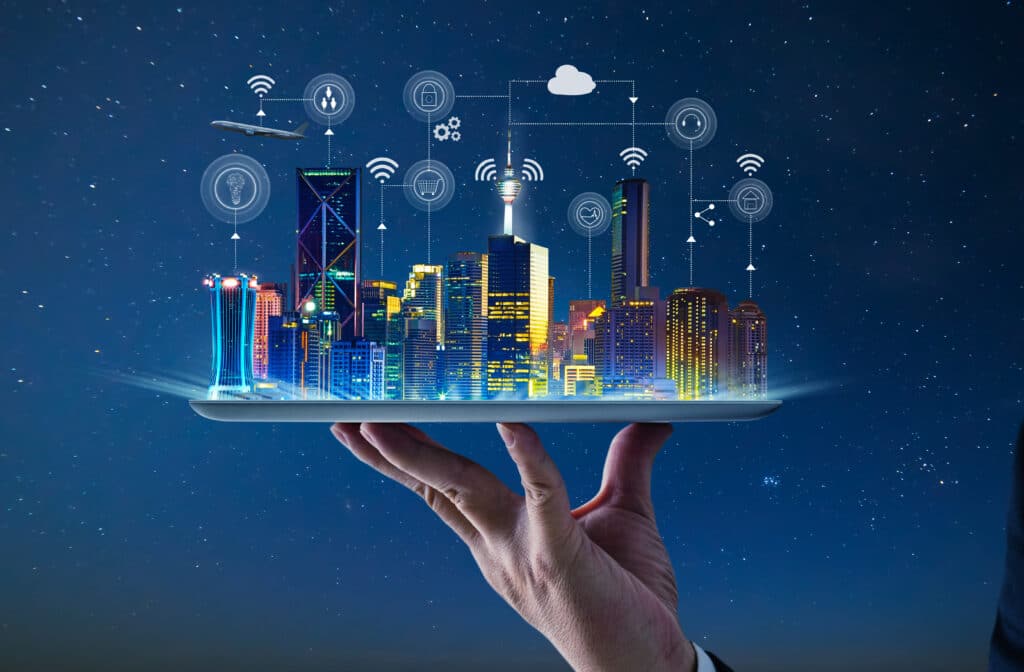
As we begin our new year, we can reflect on the important moments in the municipal government space with our municipal year in review. The world of local government is constantly changing. Laws, technology, and citizen demands ensure that their municipalities continue to keep their finger on the pulse of progress. This article will highlight some of the major changes that have began throughout 2023, with notable technology and policy leading the way.
AccessE11 is proud to be at the forefront of modernizing the municipal space, ensuring we keep a focused approach on improving the citizen engagement and issue management process. This year, the team at AccessE11 has been lucky enough to visit enthusiastic municipal professionals from all over the world at various municipal conferences. These conferences allow us to connect with municipal leaders, stakeholders, and the dedicated new generation in local government, all committed to improving their communities.
First, let’s take a look at some of the most prominent technologies that are making waves in the municipal space.
AI Applications
However, the integration of AI into municipal operations also brings forth concerns and challenges. One of the primary issues is the potential for bias and discrimination in AI systems. The issue often arises from the training data of AI systems or their application methods. Municipal leaders must exercise caution and care, particularly when AI informs crucial decisions or provides risk assessments impacting lives. As we look to the future, we expect AI to maintain a critical role in city governance. Its innovations are poised to significantly improve the quality and responsiveness of municipal services. They will also improve infrastructure management and aid in sustainable city development. However, city officials must be vigilant about the ethical implications. It’s crucial to ensure transparency and accountability in AI deployments.
In essence, AI in the municipal space is a double-edged sword. While it offers exciting developments and potential efficiencies, it also requires careful consideration and management to ensure it is used responsibly and equitably. As AI continues to evolve, municipalities must stay informed and prepared to harness its benefits while mitigating its risks.
Smart Cities
Smart cities signify an evolving urban landscape where the integration of technology, especially information and communication technologies (ICT), into city infrastructure enhances efficiency, sustainability, and livability of the urban environment. In 2023, smart city initiatives have significantly advanced, largely due to the increased adoption of technologies like AI, IoT (Internet of Things), and cloud computing. These innovations facilitate data-driven decision-making and efficient resource management. For instance, municipalities are increasingly focusing on integrating these technologies into their infrastructure to improve everything from traffic management and waste disposal to energy usage and public safety.

A key trend in 2023 has been the emphasis on modular and scalable smart city solutions. Cities are adopting technologies that allow them to invest within their means and scale up as necessary. The result of this adoption creates a balance between modernization and budgetary constraints. This approach facilitates the quick derivation of actionable insights and efficient allocation of resources, which is crucial for small and medium-sized cities with limited budgets. Additionally, there’s a growing focus on using data-driven approaches for transparent decision-making in cities. Initiatives like NYC Open Data, DataSF, and Dublinked exemplify the shift towards leveraging data to drive efficient operations, while underscoring the importance of data security, privacy, and regulatory compliance.
Looking forward, the next few years are expected to see further advancements in smart city technologies. Particularly with an increased focus on sustainability and climate resilience. The use of AI and IoT is anticipated to become more sophisticated. The goal? Allowing for more effective management of city resources and better engagement with citizens. However, challenges related to data privacy, cybersecurity, and ensuring equitable access to technology remain crucial areas for attention. As smart cities continue to evolve, maintaining a balance between technological advancement and ethical considerations will be key to their sustainable growth and acceptance among citizens.
Funding Opportunities
In 2023, the U.S. Government introduced various funding opportunities for small to medium municipalities, particularly through the Bipartisan Infrastructure Law. Over $300 billion has been announced, targeting local governments for infrastructure development. These opportunities aim to transform and improve communities across America. They focus on accessible and transparent applications for rebuilding and enhancing various sectors. For more detailed information on these funding opportunities, you can visit www.Build.gov for a comprehensive list and guidelines.

AccessE11 in 2023
AccessE11, a leader in citizen relationship management and engagement software, experienced an exciting year in 2023. We proudly welcomed a number of new cities to our user base, reflecting our growing influence in the municipal tech world. Our participation in multiple trade shows throughout the year enabled us to engage closely with municipal staff and leaders, furthering our understanding of their unique needs and challenges. This interaction has been pivotal in shaping our software development, giving us direction for what improvements we should focus on in 2024.
Looking ahead to next year, we’re excited to unveil several innovative features. These enhancements include SMS case submissions, single sign-on capabilities, multi-step workflow creation, and an advanced engagement module. We designed each of these features to streamline operations and enhance the user experience for our municipal clients, demonstrating our commitment to continuous improvement and client satisfaction. These upcoming offerings are a testament to AccessE11’s dedication to evolving in line with the dynamic needs of small and medium-sized municipalities.
In Conclusion
As 2023 ends and we enter 2024, there’s a clear evolution in technology within municipal governments. Most noteworthy are the significant AI advancements and smart city developments which have marked this year. These have reshaped how municipalities operate and engage with citizens. Meanwhile, challenges in ethics and data security remain. Yet, the progress in technology integration points to an exciting future.
The team at AccessE11 are eager to unveil new functionality for our users in 2024. We look forward to another exciting year of meeting municipal experts and leaders. Have a great year, and thank you for your amazing support in 2023.